剑桥12 听力test 1文本
Unit 12听力材料
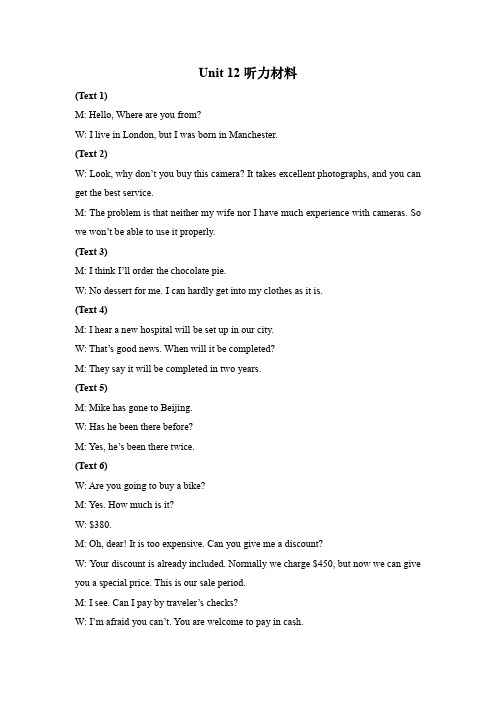
Unit 12听力材料(Text 1)M: Hello, Where are you from?W: I live in London, but I was born in Manchester.(Text 2)W: Look, why don’t you buy this camera? It takes excellent photographs, and you can get the best service.M: The problem is that neither my wife nor I have much experience with cameras. So we won’t be able to use it properly.(Text 3)M: I think I’ll order the chocolate pie.W: No dessert for me. I can hardly get into my clothes as it is.(Text 4)M: I hear a new hospital will be set up in our city.W: That’s good news. When will it be completed?M: They say it will be completed in two years.(Text 5)M: Mike has gone to Beijing.W: Has he been there before?M: Yes, he’s been there twice.(Text 6)W: Are you going to buy a bike?M: Yes. How much is it?W: $380.M: Oh, dear! It is too expensive. Can you give me a discount?W: Your discount is already included. Normally we charge $450, but now we can give you a special price. This is our sale period.M: I see. Can I pay by traveler’s checks?W: I’m afraid you can’t. You are welcome to pay in cash.(Text 7)M: Excuse me, could you give me some help?W: Yes. I’m glad to do what I can. What is your problem?M: I am a foreigner here. I just arrived here this morning. I thought it would be nice to have a look at this city. So I came out of the hotel and I have been walking and I have gotten lost.W: Can you tell me the name of your hotel?M: Unfortunately I don’t remember it. It doesn’t sound like an English name.W: Do you remember any sign of the hotel?M: I just remember there are many fashion stores nearby.W: Maybe you can follow me to the police and ask for their help.(Text 8)M: What are you reading?W: I’m reading China Daily. Look, here’s an advertisement for a concert this Saturday at the Concert Hall.M: Who’s giving the performance?W: Philly Steward. Have you ever heard of him?M: Yes, he’s a famous pianist. He plays beautifully.W: If you intend to go, I would like to go with you.M: Let me see whether I’ll be free on Saturday. Whe n does the performance start? W: It starts at 7:30.M: Fine. I’ll be free then. Let’s meet outside the Concert Hall at 7:15. Would that be all right with you?W: It would be quite all right with me.(Text 9)M: Where are you going for your holiday this year, Jean?W: Florida.M: Marvelous! How long are you going to stay there?W: One week. Just for Christmas time.M: Have you got any friends there?W: No. I have always wanted to go, but I’ve been too busy. Now I’ve got a week’s holiday, and I can enjoy Christmas special prices. My dream will come true.M: Lovely! I guess you will certainly go to Disney World.W: You are right. You have been there, haven’t you?M: Yes, but just for a couple of days.W: Tell me something about it, will you?M: There are so many things to see in the park. It has five main sections. They’re named Main Street, Frontier land, Fantasy land, Tomorrow land and Adventure land. The park is often called a “Magic Kingdom”.W: It must be a memorable experience for you.M: That is true, especially the Magic Mountain, Jungle River Boat Safari. I am sure you will enjoy your visit, too.W: Thank you. I believe so.(Text 10)Well, I manage a small branch of a large supermarket, and we lose a lot of money through shoplifting. I have to try to prevent it, or else I’ll lose all my profits. A lot of shoplifting is done by teenagers in groups. They do it for fun. They’re not frightened, so we have to make it difficult for them. Obviously a superma rket can’t have chains or alarms on the goods, so we have store detectives, who walk around like ordinary shoppers, otherwise they’ll be recognized. We have big signs up, saying “Shoplifter s Will Be Punished”, but that doesn’t help much. We’ve started putting cash desks at all the exits to prevent the shoplifters walking straight out with things. We also use closed-circuit television, but that’s expensive. In fact, all good methods of prevention are quite expensive, and naturally, they make our prices more expensive. But it has to be done, otherwise shoplifting itself will make all the prices much higher, and the public doesn’t want that! 1)。
剑桥国际少儿英语 二级(1-12) 听力原文

剑桥国际少儿英语二级(1-12) 听力原文Cambridge International Children's English Level 2(1-12) Listening TextPart 1:Hello, everyone! Welcome to Cambridge International Children's English Level 2 listening test. In this test, you will listen to some conversations and question-answer pairs. Listen carefully and choose the correct answer for each question. Now, let's begin.Conversation 1:Boy: Can I have a chocolate ice cream, please?Vendor: Sure, here you go.Boy: Thank you.Question 1: What flavor ice cream did the boy choose?A) Chocolate.B) Vanilla.C) Strawberry.Conversation 2:Girl: What's your favorite subject in school? Boy: I like Math the most.Girl: Oh, I prefer English.Question 2: What subject does the boy like?A) Math.B) English.C) Science.Question-Answer 1:Teacher: What color is the sky? Student: Blue.Question 3: What color is the sky?A) Red.B) Blue.C) Green.Question-Answer 2:Teacher: What day comes after Tuesday? Student: Wednesday.Question 4: What day comes after Tuesday?A) Monday.B) Wednesday.C) Thursday.That's the end of Part 1. Let's move on to Part 2.Part 2:In Part 2, you will hear some short stories. Listen carefully and fill in the blanks with the missing words.Story 1:Tom has a pet cat. The cat is black and white. Its name is ___________.Question 5: What is the name of Tom's pet cat?Story 2:Sarah is going to the __________ to buy some apples and bananas.Question 6: Where is Sarah going to buy fruits?Story 3:The ___________ is moving fast towards the finish line.Question 7: What is moving fast towards the finish line?That's the end of Part 2. Let's move on to Part 3.Part 3:In Part 3, you will hear a longer story. Listen carefully and answer the following questions.Story:John and Emily are going on a picnic. They have sandwiches, fruits, and drinks in their picnic basket. They find a nice spot near a lake and have their lunch. After eating, they go for a swim in the lake and play with the ducks.Question 8: What do John and Emily have in their picnic basket?A) Food and drinks.B) Toys and books.C) Clothes and shoes.Question 9: Where do they have their lunch?A) Near a river.B) Near a lake.C) Near a mountain.Question 10: What do they do after eating?A) Play with the ducks.B) Go for a swim.C) Fly kites.That's the end of Part 3. Well done, everyone! Thank you for participating in the Cambridge International Children's English Level 2 listening test. We hope you enjoyed it and did your best. Good luck!。
听力第12份文字稿与答案
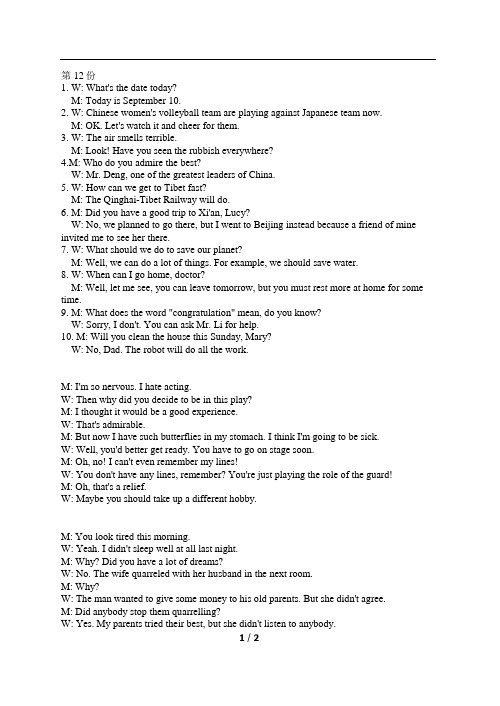
第12份1. W: What's the date today?M: Today is September 10.2. W: Chinese women's volleyball team are playing against Japanese team now.M: OK. Let's watch it and cheer for them.3. W: The air smells terrible.M: Look! Have you seen the rubbish everywhere?4.M: Who do you admire the best?W: Mr. Deng, one of the greatest leaders of China.5. W: How can we get to Tibet fast?M: The Qinghai-Tibet Railway will do.6. M: Did you have a good trip to Xi'an, Lucy?W: No, we planned to go there, but I went to Beijing instead because a friend of mine invited me to see her there.7. W: What should we do to save our planet?M: Well, we can do a lot of things. For example, we should save water.8. W: When can I go home, doctor?M: Well, let me see, you can leave tomorrow, but you must rest more at home for some time.9. M: What does the word "congratulation" mean, do you know?W: Sorry, I don't. You can ask Mr. Li for help.10. M: Will you clean the house this Sunday, Mary?W: No, Dad. The robot will do all the work.M: I'm so nervous. I hate acting.W: Then why did you decide to be in this play?M: I thought it would be a good experience.W: That's admirable.M: But now I have such butterflies in my stomach. I think I'm going to be sick.W: Well, you'd better get ready. You have to go on stage soon.M: Oh, no! I can't even remember my lines!W: You don't have any lines, remember? You're just playing the role of the guard!M: Oh, that's a relief.W: Maybe you should take up a different hobby.M: You look tired this morning.W: Yeah. I didn't sleep well at all last night.M: Why? Did you have a lot of dreams?W: No. The wife quarreled with her husband in the next room.M: Why?W: The man wanted to give some money to his old parents. But she didn't agree.M: Did anybody stop them quarrelling?W: Yes. My parents tried their best, but she didn't listen to anybody.1 / 2M: What happened later on?W: Some people in our building couldn't stop them. It made us all not go to sleep.M: You should call the police for help.W: We did. Soon a few policemen came and took them to the police station.M: Then you could fall asleep.W: Yes, I did, but it was four in the morning.The Fuyu Shoe Fair will be held at 25 Bruce Street, New York. It begins on August 3, 2010. It will open at 9 am and close at 6 pm every day. Shoes, machines, and tools of different kinds, sizes, colours and materials will be on show. Last year, more than 150 companies came to show their products. People everywhere are welcome and you don't need to buy a ticket. It's free, but visitors under 18 will not be allowed in. The fair will close on August 6. Don't miss the chance to see this great show. You can telephone 58990446 or send an e-mail to service@ Fuyu . Our workers will meet you at the bus station or the airport. If you want more information, check on our website.BACBC,CBABC,BBCAB,ACBAA2 / 2。
剑桥雅思12Test7雅思听力Section1答案+解析
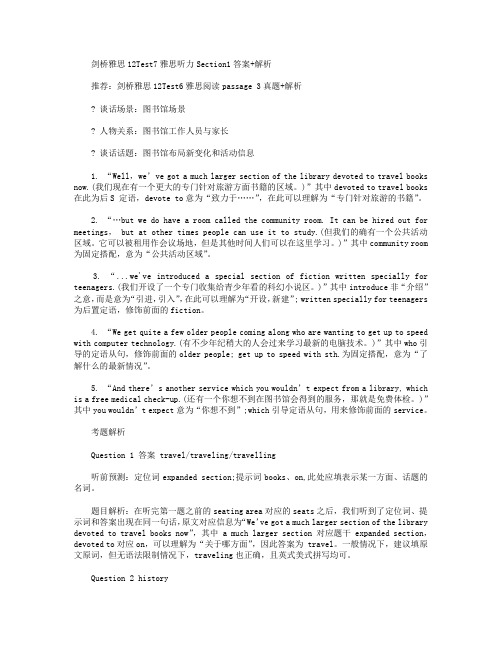
剑桥雅思12Test7雅思听力Section1答案+解析推荐:剑桥雅思12Test6雅思阅读passage 3真题+解析? 谈话场景:图书馆场景? 人物关系:图书馆工作人员与家长? 谈话话題:图书馆布局新变化和活动信息1. “Well,we’ve got a much larger section of the library devoted to travel books now.(我们现在有一个更大的专门针对旅游方面书籍的区域。
)”其中devoted to travel books 在此为后S 定语,devote to意为“致力于……”,在此可以理解为“专门针对旅游的书籍”。
2. “…but we do have a room called the community room. It can be hired out for meetings, but at other times people can use it to study.(但我们的确有一个公共活动区域。
它可以被租用作会议场地,但是其他时间人们可以在这里学习。
)”其中community room 为固定搭配,意为“公共活动区域”。
3. “...we've introduced a special section of fiction written specially for teenagers.(我们开设了一个专门收集给青少年看的科幻小说区。
)”其中introduce非“介绍”之意,而是意为“引进,引入”,在此可以理解为“开设,新建”; written specially for teenagers 为后置定语,修饰前面的fiction。
4. “We get quite a few older people coming along who are wanting to get up to speed with computer technology.(有不少年纪稍大的人会过来学习最新的电脑技术。
剑桥雅思12test1passage1阅读原文翻译
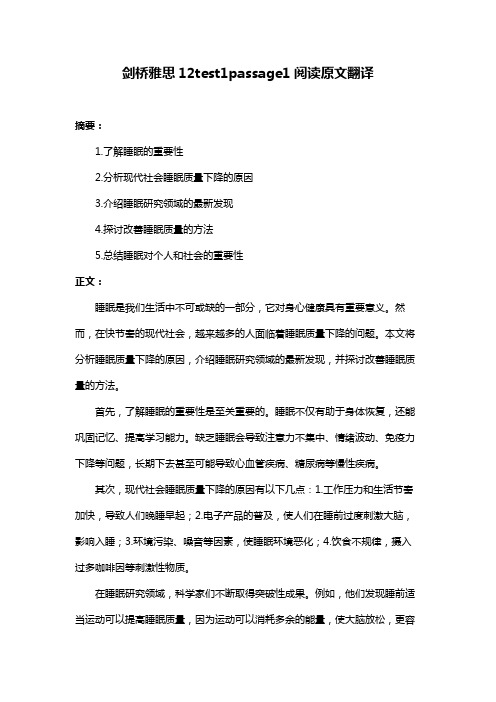
剑桥雅思12test1passage1阅读原文翻译摘要:1.了解睡眠的重要性2.分析现代社会睡眠质量下降的原因3.介绍睡眠研究领域的最新发现4.探讨改善睡眠质量的方法5.总结睡眠对个人和社会的重要性正文:睡眠是我们生活中不可或缺的一部分,它对身心健康具有重要意义。
然而,在快节奏的现代社会,越来越多的人面临着睡眠质量下降的问题。
本文将分析睡眠质量下降的原因,介绍睡眠研究领域的最新发现,并探讨改善睡眠质量的方法。
首先,了解睡眠的重要性是至关重要的。
睡眠不仅有助于身体恢复,还能巩固记忆、提高学习能力。
缺乏睡眠会导致注意力不集中、情绪波动、免疫力下降等问题,长期下去甚至可能导致心血管疾病、糖尿病等慢性疾病。
其次,现代社会睡眠质量下降的原因有以下几点:1.工作压力和生活节奏加快,导致人们晚睡早起;2.电子产品的普及,使人们在睡前过度刺激大脑,影响入睡;3.环境污染、噪音等因素,使睡眠环境恶化;4.饮食不规律,摄入过多咖啡因等刺激性物质。
在睡眠研究领域,科学家们不断取得突破性成果。
例如,他们发现睡前适当运动可以提高睡眠质量,因为运动可以消耗多余的能量,使大脑放松,更容易入睡。
此外,保持规律的作息时间、营造舒适的睡眠环境、避免临睡前过度用脑等措施也有助于改善睡眠质量。
最后,睡眠对个人和社会的重要性不容忽视。
良好的睡眠可以提高工作效率、增进人际关系、降低医疗成本等。
因此,我们每个人都应该关注自己的睡眠质量,养成良好的作息习惯,为自己创造一个良好的睡眠环境。
总之,睡眠质量下降已成为现代社会的一个突出问题。
通过了解睡眠的重要性、分析原因以及采取相应的改善措施,我们可以提高睡眠质量,从而提高生活质量。
剑桥雅思12test1passage1阅读原文翻译
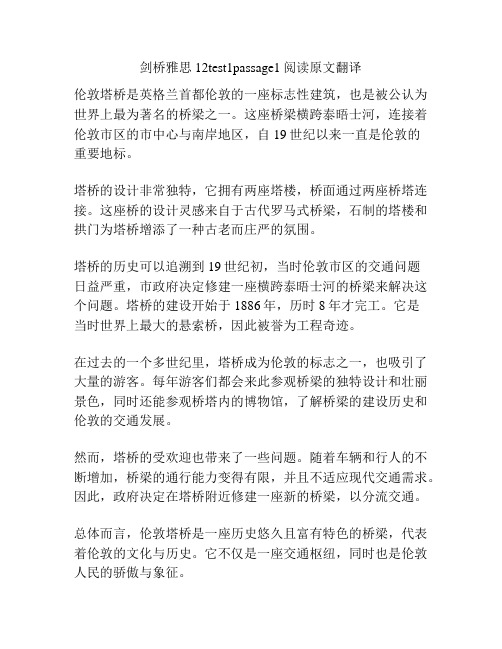
剑桥雅思12test1passage1阅读原文翻译
伦敦塔桥是英格兰首都伦敦的一座标志性建筑,也是被公认为世界上最为著名的桥梁之一。
这座桥梁横跨泰晤士河,连接着伦敦市区的市中心与南岸地区,自19世纪以来一直是伦敦的
重要地标。
塔桥的设计非常独特,它拥有两座塔楼,桥面通过两座桥塔连接。
这座桥的设计灵感来自于古代罗马式桥梁,石制的塔楼和拱门为塔桥增添了一种古老而庄严的氛围。
塔桥的历史可以追溯到19世纪初,当时伦敦市区的交通问题
日益严重,市政府决定修建一座横跨泰晤士河的桥梁来解决这个问题。
塔桥的建设开始于1886年,历时8年才完工。
它是
当时世界上最大的悬索桥,因此被誉为工程奇迹。
在过去的一个多世纪里,塔桥成为伦敦的标志之一,也吸引了大量的游客。
每年游客们都会来此参观桥梁的独特设计和壮丽景色,同时还能参观桥塔内的博物馆,了解桥梁的建设历史和伦敦的交通发展。
然而,塔桥的受欢迎也带来了一些问题。
随着车辆和行人的不断增加,桥梁的通行能力变得有限,并且不适应现代交通需求。
因此,政府决定在塔桥附近修建一座新的桥梁,以分流交通。
总体而言,伦敦塔桥是一座历史悠久且富有特色的桥梁,代表着伦敦的文化与历史。
它不仅是一座交通枢纽,同时也是伦敦人民的骄傲与象征。
剑桥雅思12Test5雅思听力Section1答案+解析
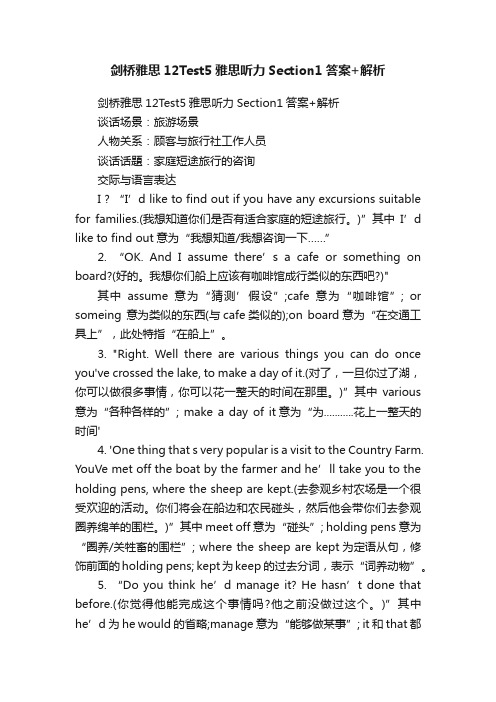
剑桥雅思12Test5雅思听力Section1答案+解析剑桥雅思12Test5雅思听力Section1答案+解析谈话场景:旅游场景人物关系:顾客与旅行社工作人员谈话话題:家庭短途旅行的咨询交际与语言表达I ? “I’d like to find out if you have any excursions suitable for families.(我想知道你们是否有适合家庭的短途旅行。
)”其中I’d like to find out意为“我想知道/我想咨询一下……”2. “OK. And I assume there’s a cafe or something on board?(好的。
我想你们船上应该有咖啡馆成行类似的东西吧?)"其中assume意为“猜测’假设”;cafe意为“咖啡馆”; or someing 意为类似的东西(与cafe类似的);on board意为“在交通工具上”,此处特指“在船上”。
3. "Right. Well there are various things you can do once you've crossed the lake, to make a day of it.(对了,一旦你过了湖,你可以做很多事情,你可以花一整天的时间在那里。
)”其中various 意为“各种各样的”; make a day of it意为“为...........花上一整天的时间'4. 'One thing that s very popular is a visit to the Country Farm. YouVe met off the boat by the farmer and he’ll take you to the holding pens, where the sheep are kept.(去参观乡村农场是一个很受欢迎的活动。
雅思12 test1 part1的小作文
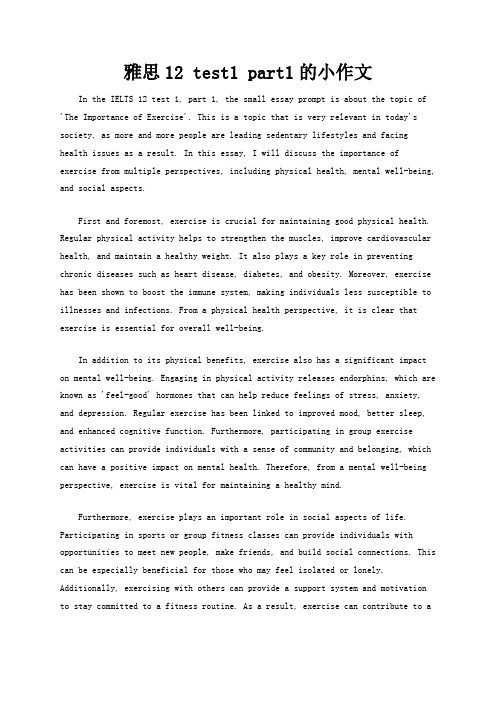
雅思12 test1 part1的小作文In the IELTS 12 test 1, part 1, the small essay prompt is about the topic of 'The Importance of Exercise'. This is a topic that is very relevant in today's society, as more and more people are leading sedentary lifestyles and facing health issues as a result. In this essay, I will discuss the importance of exercise from multiple perspectives, including physical health, mental well-being, and social aspects.First and foremost, exercise is crucial for maintaining good physical health. Regular physical activity helps to strengthen the muscles, improve cardiovascular health, and maintain a healthy weight. It also plays a key role in preventing chronic diseases such as heart disease, diabetes, and obesity. Moreover, exercise has been shown to boost the immune system, making individuals less susceptible to illnesses and infections. From a physical health perspective, it is clear that exercise is essential for overall well-being.In addition to its physical benefits, exercise also has a significant impact on mental well-being. Engaging in physical activity releases endorphins, which are known as 'feel-good' hormones that can help reduce feelings of stress, anxiety, and depression. Regular exercise has been linked to improved mood, better sleep, and enhanced cognitive function. Furthermore, participating in group exercise activities can provide individuals with a sense of community and belonging, which can have a positive impact on mental health. Therefore, from a mental well-being perspective, exercise is vital for maintaining a healthy mind.Furthermore, exercise plays an important role in social aspects of life. Participating in sports or group fitness classes can provide individuals with opportunities to meet new people, make friends, and build social connections. This can be especially beneficial for those who may feel isolated or lonely. Additionally, exercising with others can provide a support system and motivation to stay committed to a fitness routine. As a result, exercise can contribute to asense of belonging and social integration, which are important aspects of overall well-being.It is important to recognize that the importance of exercise extends beyond individual well-being to the broader community and society. Regular physical activity can reduce the burden on healthcare systems by preventing chronic diseases and reducing healthcare costs. It can also contribute to a more productive workforce, as individuals who exercise regularly tend to have higher levels of energy and productivity. Furthermore, promoting a culture of exercise and physical activity can lead to a healthier, happier, and more cohesive society as a whole.In conclusion, the importance of exercise cannot be overstated. From physical health and mental well-being to social aspects and broader societal impacts, exercise plays a crucial role in overall well-being. It is essential for individuals to prioritize regular physical activity in their lives and for communities and governments to promote and support a culture of exercise. By recognizing the multifaceted benefits of exercise, we can work towards a healthier and happier future for all.。
托福TPO12听力Conversation1文本+题目+答案解析
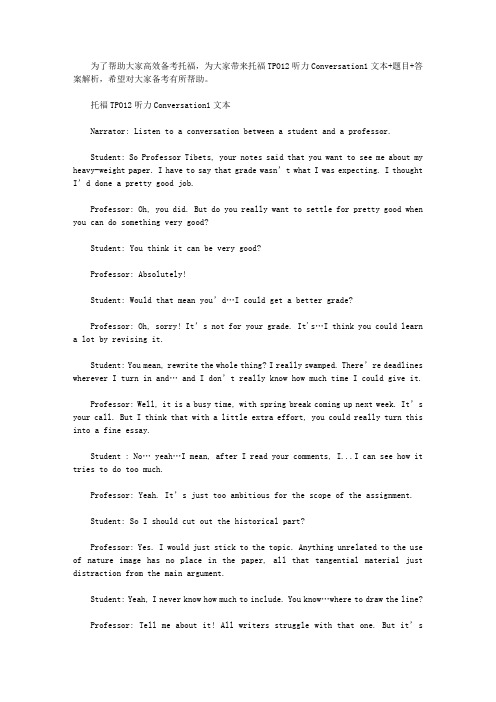
为了帮助大家高效备考托福,为大家带来托福TPO12听力Conversation1文本+题目+答案解析,希望对大家备考有所帮助。
托福TPO12听力Conversation1文本 Narrator: Listen to a conversation between a student and a professor. Student: So Professor Tibets, your notes said that you want to see me about my heavy-weight paper. I have to say that grade wasn’t what I was expecting. I thought I’d done a pretty good job. Professor: Oh, you did. But do you really want to settle for pretty good when you can do something very good? Student: You think it can be very good? Professor: Absolutely! Student: Would that mean you’d…I could get a better grade? Professor: Oh, sorry! It’s not for your grade. It's…I think you could learn a lot by revising it. Student: You mean, rewrite the whole thing? I really swamped. There’re deadlines wherever I turn in and… and I don’t really know how much time I could give it. Professor: Well, it is a busy time, with spring break coming up next week. It’s your call. But I think that with a little extra effort, you could really turn this into a fine essay. Student : No… yeah…I mean, after I read your comments, I...I can see how it tries to do too much. Professor: Yeah. It’s just too ambitious for the scope of the assignment. Student: So I should cut out the historical part? Professor: Yes. I would just stick to the topic. Anything unrelated to the use of nature image has no place in the paper, all that tangential material just distraction from the main argument. Student: Yeah, I never know how much to include. You know…where to draw the line? Professor: Tell me about it! All writers struggle with that one. But it’ssomething you can learn. That will become more clear with practice. But I think if you just cut out the…emm… Student: The stuff about history, but if I cut out those sections, won’t it be too short? Professor: Well, better a short well-structured paper than a long paper that’s poorly-structured and wanders off topic. Student: So all I have to do is to leave those sections? Professor: Well, not so fast. After you cut out those sections, you’ll have to go back and revise the rest, to see how it all fits together. And of course, you’ll have to revise the introduction too, to accurately describe what you do in the body of the paper. But that shouldn’t be too difficult. Just remember to keep the discussion focused. Do you think you can get it to me by noon tomorrow? Student: Wow…emm…I have so much…er…but I’ll try. Professor: OK, good! Do try! But if you can’t, well, shoot for after spring break, OK? 托福TPO12听力Conversation1题目 1.Why does the professor ask the man to come to her office? A. To check on the man’s progress on a paper he is writing B. To show the man techniques for organizing his time C. To encourage the man to revise a paper he wrote D. To clarify her comments on a paper the man wrote 2.Why does the man hesitate before agreeing to the professor’s request? A. He is not sure his effort would be successful. B. He feels overwhelmed by all his schoolwork C. He is unclear about what the professor wants his to do. D. He does not like to work on more than one assignment at a time.。
雅思12test1范文
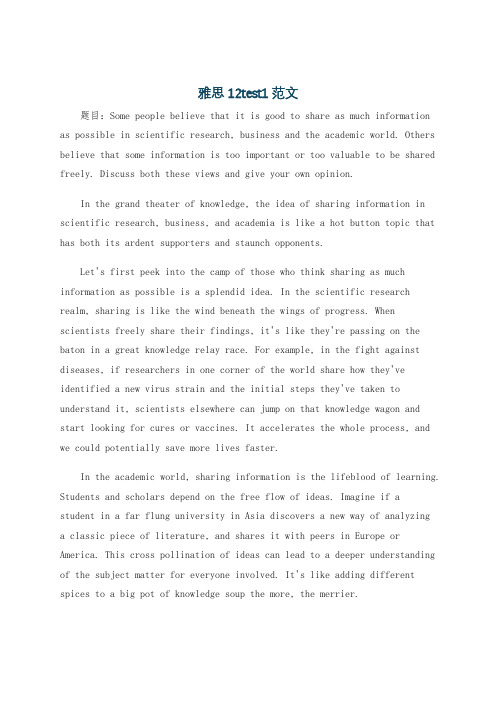
雅思12test1范文题目:Some people believe that it is good to share as much information as possible in scientific research, business and the academic world. Others believe that some information is too important or too valuable to be shared freely. Discuss both these views and give your own opinion.In the grand theater of knowledge, the idea of sharing information in scientific research, business, and academia is like a hot button topic that has both its ardent supporters and staunch opponents.Let's first peek into the camp of those who think sharing as much information as possible is a splendid idea. In the scientific research realm, sharing is like the wind beneath the wings of progress. When scientists freely share their findings, it's like they're passing on the baton in a great knowledge relay race. For example, in the fight against diseases, if researchers in one corner of the world share how they've identified a new virus strain and the initial steps they've taken to understand it, scientists elsewhere can jump on that knowledge wagon and start looking for cures or vaccines. It accelerates the whole process, and we could potentially save more lives faster.In the academic world, sharing information is the lifeblood of learning. Students and scholars depend on the free flow of ideas. Imagine if astudent in a far flung university in Asia discovers a new way of analyzinga classic piece of literature, and shares it with peers in Europe or America. This cross pollination of ideas can lead to a deeper understanding of the subject matter for everyone involved. It's like adding different spices to a big pot of knowledge soup the more, the merrier.In business, well, some might think sharing information is like giving away trade secrets. But think about it this way: sharing best practices in management or new, more efficient production techniques can actuallybenefit the whole industry. It can create a more level playing field, andin the long run, companies might find themselves in a more innovative and competitive environment.Now, onto the other side of the coin those who firmly believe that some information is just too precious to be shared willy nilly. In scientific research, there are often cases where companies or institutions have spenta truckload of money and countless hours on a project. They might have discovered a new drug formula that could be a goldmine. If they share this information freely, they might not be able to recoup their investment. It's like they've been baking a delicious cake for ages, and if they give away the recipe for free, they'll be left with nothing but the smell of the cake.In business, trade secrets are the crown jewels. A company might have a unique manufacturing process that gives it an edge over its competitors. If this information gets out, it could be like a Trojan horse in their well fortified business castle. Their competitors could swoop in and steal their thunder, leaving them high and dry.In my humble opinion, I think there needs to be a balance. We can't be like information Scrooges, hoarding everything, but we also can't be so naive as to think that all information should be up for grabs. Inscientific research, for example, basic research findings should be shared freely to foster global progress. But when it comes to the nitty gritty details of a commercially viable product, there should be some protection.In academia, knowledge should flow freely among scholars and students, but perhaps with some ethical guidelines to ensure proper attribution. And in business, while sharing some general good practice ideas can be beneficial,a company's core competitive information should be safeguarded. It's all about finding that sweet spot where the benefits of sharing are maximized, while also respecting the value of hard earned and often costly information.。
剑桥实境英语听说1-Lesson 12
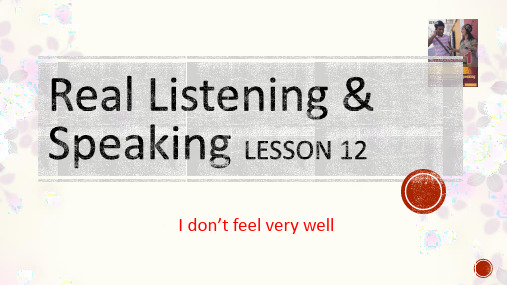
▪Without the subject YOU.
▪Listening-At the doctor’s ▪Imagine you are at the doctor’s, and the doctor is giving you advice. ▪Listen to 3 doctors and tick T or F.
▪ three days ago ▪ the day before yesterday ▪ yesterday ▪ today ▪ tomorrow ▪ the day after tomorrow ▪ three days after
▪Adli, from Saudi Arabia, and Fernando, from Brazil, are phoning to make a doctor’y well
▪ I don’t feel very well. ▪ I’ve got a stomachache/ backache. ▪ I have earache/ toothache. ▪ I’ve got a terrible cough/ sore throat/ cold. ▪ I think I have a temperature. ▪ Have you got something for sunburn. ▪ What have you got for a headache? ▪ How many tablets should I take? ▪ How much cream should I use? ▪ I’d like to make an appointment, please.
▪Check important details ▪Underline the expression that Adli and Fernando both use to check they understand important details.
剑桥雅思12 test 1 大作文
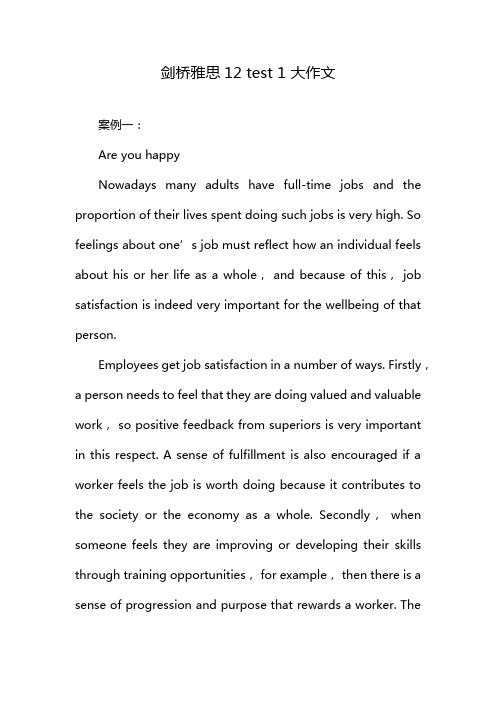
剑桥雅思12 test 1 大作文案例一:Are you happyNowadays many adults have full-time jobs and the proportion of their lives spent doing such jobs is very high. So feelings about one’s job must reflect how an individual feels about his or her life as a whole,and because of this,job satisfaction is indeed very important for the wellbeing of that person.Employees get job satisfaction in a number of ways. Firstly,a person needs to feel that they are doing valued and valuable work, so positive feedback from superiors is very important in this respect. A sense of fulfillment is also encouraged if a worker feels the job is worth doing because it contributes to the society or the economy as a whole. Secondly,when someone feels they are improving or developing their skills through training opportunities, for example, then there is a sense of progression and purpose that rewards a worker. Thesense of belonging to a team or a working community also contributes to job satisfaction because colleagues help each other to enjoy their working lives. Satisfaction is also increased by a sense of responsibility for and loyalty to a team.Of course not everyone enjoys their work. Hard economic realities mean that many people have little choice in the kind of job they can get. In some cases an employee is working in a job that suits neither their skills nor their personality. Some jobs are repetitive and boring, and labour relations may be poor and lead to resentment and insecurity rather than to job satisfaction.However, even though it is unlikely that all workers do feel happy in their work, I think it is not unrealistic to promote more job satisfaction in any job. If the factors identified above are implemented, then any job can be improved and more workers can feel greater degrees of job satisfaction.As most people spend a major part of their adult life at work, job satisfaction is an important element of individual wellbeing. What factors contribute to job satisfaction? Howrealistic is the expectation of job satisfaction for all workers?案例二:Are you happyTwo year ago, Chinese biggest TV Channel played an interview which brought great response to the audience. The interview is about a journalist asked a worker that if he felt happy, the worker didn't react what the question is, he answered that he his name is not happy. The interview became hot, everyone was taking about it, "Are you happy" has become a greeting when people meet, they made fun of it. The reason why the interview becomes so popular is that people lack of sense of happiness today, they find a way to make fun of happiness. As the development of technology, people live in a fast-pace lifestyle, the pressure from work is so heavy that people focus too much on work, they don't have time to relax, many people bring the work issues to home, keeping busy all the time. We should find the balance between work and family life, try to enjoy life.。
剑桥雅思12test1passage1阅读原文翻译
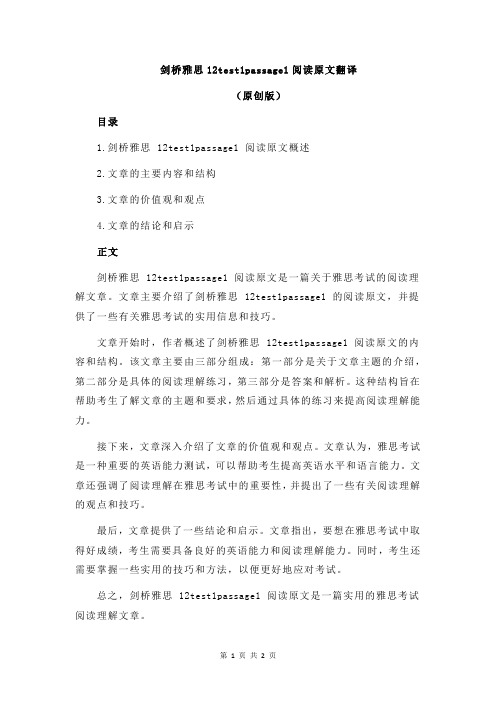
剑桥雅思12test1passage1阅读原文翻译
(原创版)
目录
1.剑桥雅思 12test1passage1 阅读原文概述
2.文章的主要内容和结构
3.文章的价值观和观点
4.文章的结论和启示
正文
剑桥雅思 12test1passage1 阅读原文是一篇关于雅思考试的阅读理解文章。
文章主要介绍了剑桥雅思 12test1passage1 的阅读原文,并提供了一些有关雅思考试的实用信息和技巧。
文章开始时,作者概述了剑桥雅思 12test1passage1 阅读原文的内容和结构。
该文章主要由三部分组成:第一部分是关于文章主题的介绍,第二部分是具体的阅读理解练习,第三部分是答案和解析。
这种结构旨在帮助考生了解文章的主题和要求,然后通过具体的练习来提高阅读理解能力。
接下来,文章深入介绍了文章的价值观和观点。
文章认为,雅思考试是一种重要的英语能力测试,可以帮助考生提高英语水平和语言能力。
文章还强调了阅读理解在雅思考试中的重要性,并提出了一些有关阅读理解的观点和技巧。
最后,文章提供了一些结论和启示。
文章指出,要想在雅思考试中取得好成绩,考生需要具备良好的英语能力和阅读理解能力。
同时,考生还需要掌握一些实用的技巧和方法,以便更好地应对考试。
总之,剑桥雅思 12test1passage1 阅读原文是一篇实用的雅思考试阅读理解文章。
剑桥12 听力test 1文本
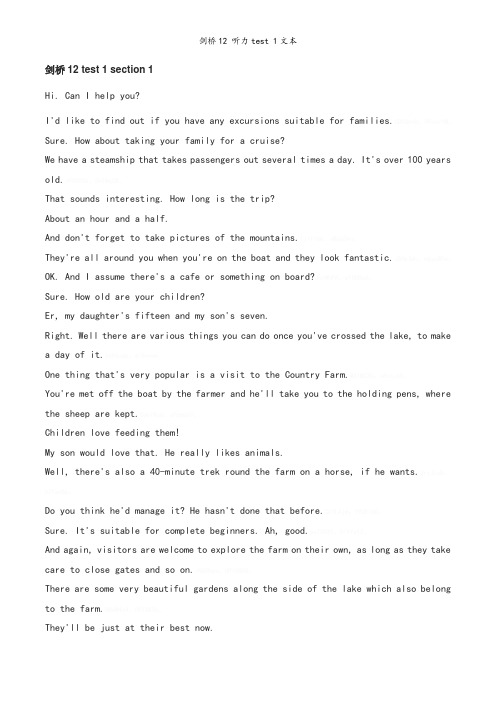
剑桥12 test 1 section 1Hi. Can I help you?I'd like to find out if you have any excursions suitable for families.GD0QnnD。
P9ccz1M。
Sure. How about taking your family for a cruise?We have a steamship that takes passengers out several times a day. It's over 100 years old.JfCVG0b。
5kfAqZW。
That sounds interesting. How long is the trip?About an hour and a half.And don't forget to take pictures of the mountains.1jlf1db。
sMoq54n。
They're all around you when you're on the boat and they look fantastic.JB4p3dn。
wgyqBEw。
OK. And I assume there's a cafe or something on board?JcyWhFK。
e1HGRpX。
Sure. How old are your children?Er, my daughter's fifteen and my son's seven.Right. Well there are various things you can do once you've crossed the lake, to make a day of it.tc9Azqb。
di9xrmh。
One thing that's very popular is a visit to the Country Farm.MA1MC2h。
(完整)剑桥国际少儿英语kb1unit12听力原文

(完整)剑桥国际少儿英语kb1unit12听力原文编辑整理:尊敬的读者朋友们:这里是精品文档编辑中心,本文档内容是由我和我的同事精心编辑整理后发布的,发布之前我们对文中内容进行仔细校对,但是难免会有疏漏的地方,但是任然希望((完整)剑桥国际少儿英语kb1unit12听力原文)的内容能够给您的工作和学习带来便利。
同时也真诚的希望收到您的建议和反馈,这将是我们进步的源泉,前进的动力。
本文可编辑可修改,如果觉得对您有帮助请收藏以便随时查阅,最后祝您生活愉快业绩进步,以下为(完整)剑桥国际少儿英语kb1unit12听力原文的全部内容。
Unit 12 Party time1。
Listen and point.Suzy:What are you eating,everybody?Simon: I’m eating a big burger。
Stella:And I’m eating a banana。
Suzy:Hmmm. What have you got,Mum?Mrs Star: I’ve got a big red apple.Suzy: What’s that,Dad?Mr Star:It's chocolate ice cream. My favourite.Suzy:Grandpa,are you eating ice cream too?Grandpa:No, I’m eating fish。
Suzy: Hmmm。
Can I have some cake, please? Cake’s my favourite.Grandma: Yes,Suzy, I know. Here you are.Suzy:Ooooohh, thank you.2。
Listen,point and repeat.Apple,ice cream, banana, cake, burger, chocolate3. Say the chant.Apple, apple。
- 1、下载文档前请自行甄别文档内容的完整性,平台不提供额外的编辑、内容补充、找答案等附加服务。
- 2、"仅部分预览"的文档,不可在线预览部分如存在完整性等问题,可反馈申请退款(可完整预览的文档不适用该条件!)。
- 3、如文档侵犯您的权益,请联系客服反馈,我们会尽快为您处理(人工客服工作时间:9:00-18:30)。
剑桥12 test 1 section 1Hi. Can I help you?I'd like to find out if you have any excursions suitable for families.Sure. How about taking your family for a cruise?We have a steamship that takes passengers out several times a day. It's over 100 years old. That sounds interesting. How long is the trip?About an hour and a half.And don't forget to take pictures of the mountains.They're all around you when you're on the boat and they look fantastic.OK. And I assume there's a cafe or something on board?Sure. How old are your children?Er, my daughter's fifteen and my son's seven.Right. Well there are various things you can do once you've crossed the lake, to make a day of it.One thing that's very popular is a visit to the Country Farm.You're met off the boat by the farmer and he'll take you to the holding pens, where the sheep are kept.Children love feeding them!My son would love that. He really likes animals.Well, there's also a 40-minute trek round the farm on a horse, if he wants.Do you think he'd manage it? He hasn't done that before.Sure. It's suitable for complete beginners. Ah, good.And again, visitors are welcome to explore the farm on their own, as long as they take care to close gates and so on.There are some very beautiful gardens along the side of the lake which also belong to the farm.They'll be just at their best now.You could easily spend an hour or two there.OK.Well that all sounds good. And can we get lunch there?You can, and it's very good, though it's not included in the basic cost.You pay when you get there. Right.So is there anything else to do over on that side of the lake?Well, what you can do is take a bike over on the ship and then go on a cycling trip.There's a trail there called the Back Road.You could easily spend three or four hours exploring it and the scenery's wonderful.They'll give you a map when you get your ticket for the cruise-there's no extra charge. What's the trail like in terms of difficulty?Quits challenging in places. It wouldn't be suitable for your seven-year-old.It needs someone who's got a bit more experience.Hmm. Well, my daughter loves cycling and so do I, so maybe the two of us could go, and my wife and son could stay on the farm.That might work out quite well.But we don't have bikes here...Is there somewhere we could rent them?Yes, there's a place here in the city. It's called Ratchesons.I'll just make a note of that- er, how do you spell it?R-A-T-C-H-E-S-0-N-S. It's just by the cruise ship terminal. OK.You'd also need to pick up a repair kit for the bike from there to take along with you,and you'd need to take along a snack and some water.It'd be best to get those in the city.Fine. That shouldn't be a problem.And I assume I can rent a helmet from the bike place?Sure, you should definitely get that.It's a great ride, but you want to be well prepared because it's very remote.You won't see any shops round there, or anywhere to stay, so you need to get back in time for the last boat.Yeah. So what sort of prices are we looking at here?Let's see, that'd be one adult and one child for the cruise with farm tour, that's $117,and an adult and a child for the cruise only so that's $214 dollars altogether.Oh, wait a minute, how old did you say your daughter was? Fifteen.Then I'm afraid it's $267 because she has to pay the adult fare, which is $75 instead of the child fare which is $22- sorry about that.That's okay. Er, so how do...Section2Good morning everyone. My name's Joy Perkins and I'm the restaurant manager.And I understand that none of you've had any previous experience as kitchen assistants. Well, you might be feeling a bit nervous now, but most of our kitchen assistants say they enjoy the work.OK, they might get shouted at sometimes, but it's nothing personal,and they're pleased that they have so many different things to do, which means they never get bored.And I'll tell you straightaway that if you do well, we might think about moving you up and giving you some more responsibility.Right, well, you've all shown up on time, which is an excellent start.Now I'm glad to see none of you have unsuitable footwear,so that's good - you need to be careful as the floors can get very wet and slippery.Those of you with long hair have got it well out of the way,but some of you will need to remove your rings and braceletsjust put them somewhere safe for today, and remember to leave them at home tomorrow, as they can be a safety hazard.Now it's going to be a busy day for you all today - we don't have any tables free for this evening, and only a few for lunch.Fortunately we've got our head chef back - he was away on holiday all last week which meant the other chefs had extra work.Now, I'll tell you a bit more about the job in a minute but first, some general regulations.For all of you, whatever your age, there's some equipment you mustn't use until you've been properly trained,like the waste disposal system for example, for health and safety reasons.Then I think there are two of you here are under 18 - that's Emma and Jake, isn't it? Right, so for you two, the meat slicer is out of bounds.And of course none of you are allowed to use the electric mixer until you've been shown how it works.Now you may have heard that this can be a stressful job, and I have to say that can be true. You'll be working an eight-hour day for the first week,though you'll have the chance to do overtime after that as well if you want to.But however long the hours are, you'll get a break in the middle.What you will find is that you're on your feet all day long, lifting and carrying, so if you're not fit now you soon will be!You'll find you don't have much chance to take it easywhen someone tell you to do something you need to do it straightawaybut at least we do have a very efficient air conditioning system compared with some kitchens.Now let me tell you about some of the people you need to know.So as I said, I'm Joy Perkins and I decide who does what during the day and how long they work for.I'll be trying to get you to work with as many different people in the kitchen as possible,so that you learn while you're on the job.One person whose name you must remember is David Field.If you injure yourself at all, even if it's really minor,you must report to him and he'll make sure the incident is recorded and you get the appropriate treatment.He's trained to give basic treatment to staff himself, or he'll send you off somewhere else if necessary.Then there's Dexter Wills - he's the person you need to see if you smash a plate or something like that.Don't just leave it and hope no one will noticeit's really important to get things noted and replaced or there could be problems later.And finally, there's Mike Smith.He is a member of staff who takes care of all the stores of perishables,so if you notice we're getting low in flour or sugar or something, make sure you let him know so he can put in an order.OK, now the next thing...Section 3OK, Stewart. We need to start planning our paper on public libraries.Have you thought of an angle yet?Well, there's so much we could look into.How libraries have changed over the centuries, for instance, or how different countries organise them.What do you think, Trudie?Maybe we should concentrate on this country, and try and relate the changes in libraries to external developments,like the fact that far more people can read than a century ago, and that the local population may speak lots of different languages.We could include something about changes in the source of funding, too.Yes, but remember we're only supposed to write a short paper, so it's probably best if we don't go into funding in any detail.Right. Well, shall we just brainstorm a few ideas, to get started?OK. We obviously need to look at the impact of new technology, particularly the internet. Now that lots of books have been digitalised, people can access them from their own computers at home.And if everyone did that, libraries would be obsolete.Yes. But the digitalised books that are available online for free are mostly out of copyright, aren't they?And copyright in this country lasts for 70 years after the author dies.So you won't find the latest best-seller or up-to-date information. That's an important point.Anyway, I find it hard to concentrate when I'm reading a long text on a screen.I'd much rather read a physical book. And it takes longer to read on a screen.Oh, I prefer it. I suppose it's just a personal preference.Mm. I expect that libraries will go on evolving in the next few years.Some have already become centres where community activities take place, like local clubs meeting there.I think that'll become even more common.I'd like to think so, and that they're still be serving their traditional function, but I'm not so sure.There are financial implications, after all.What I'm afraid will happen is that books and magazines will all disappear, and there'll just be rows and rows of computers.They won't look anything like the libraries we're used to.Well, we'll see.I've just had an idea.Why don't we make an in-depth study of our local public library as background to our paper? Yes, that'd be interesting, and raise all sorts of issues.Let's make a list of possible things we could ask about, then work out some sort of structure. For instance, um, we could interview some of the staff,and find out whether the library has its own budget, or if that's controlled by the local council. And what their policies are.I know they don't allow food, but I'd love to find out what types of noise they banthere always seems to be a lot of talking, but never music.I don't know if that's a policy or it just happens.Ah, I've often wondered.Then there are things like how the library is affected by employment laws.I suppose there are rules about working hours, facilities for staff, and so on.Right. Then there are other issues relating to the design of the building and how customers use it.Like what measures does the library take to ensure their safety?They'd need floor coverings that aren't slippery, and emergency exits, for instance.Oh, and another thing - there's the question of the kind of insurance the library needs to have, in case anyone gets injured.Yes, that's something else to find out.You know something I've often wondered? What's that?Well, you know they've got an archive of local newspapers going back years?Well, next to it they've got the diary of a well-known politician from the late 19th century.I wonder why it's there.Do you know what his connection was with this area?No idea. Let's add it to our list of things to find out.Oh, I've just thought - you know people might ask in the library about local organisations, like sports clubs?Well, I wonder if they keep a database, or whether they just look online.Right. I quite fancy finding out what the differences are between a library that's open to the public and one that's part of a museum,for example - they must be very different.Mmm. Then something else I'd like to know is...Section 4In public discussion of business, we take certain values for granted.Today I'm going to talk about four of them: collaboration, hard work, creativity and excellence.Most people would say they're all 'good things'.I'm going to suggest that's an over-simple view.The trouble with these values is that they're theoretical concepts, removed from the reality of day-to-day business.Pursue values by all means, but be prepared for what may happen as a result.They can actually cause damage, which is not at all the intention.Business leaders generally try to do the right thing.But all too often the right thing backfires, if those leaders adopt values without understanding and managing the side effects that arise.The values can easily get in the way of what's actually intended.OK. So the first value I'm going to discuss is collaboration. Er, let me give you an example. On a management training course I once attended,we were put into groups and had to construct a bridge across a stream, using building blocks that we were given.The rule was that everyone in the team had to move at least one building block during the construction.This was intended to encourage teamwork.But it was really a job best done by one person.The other teams tried to collaborate on building the structure and descended into confusion, with everyone getting in each other's way.Our team leader solved the challenge brilliantly.She simply asked everyone in the team to move a piece a few centimetres, to comply with the rule,and then let the person in the team with an aptitude for puzzles like this build it alone.We finished before any other team.My point is that the task wasn't really suited to team-working, so why make it one? Teamwork can also lead to inconsistency - a common cause of poor sales.In the case of a smartphone that a certain company launched,one director wanted to target the business market, and another demanded it was aimed at consumers.The company wanted both directors to be involved, so gave the product a consumer-friendly name, but marketed it to companies.The result was that it met the needs of neither group.It would have been better to let one director or the other have his way, not both.Now industriousness, or hard work.It's easy to mock people who say they work hard: after all, a hamster running around in a wheel is working hard - and getting nowhere.Of course hard work is valuable but only when properly targeted.Otherwise it wastes the resources that companies value most - time and energy.And that's bad for the organisation.There's a management model that groups people according to four criteria: clever, hardworking, stupid and lazy.Here 'lazy' means having a rational determination not to carry out unnecessary tasks.It doesn't mean trying to avoid work altogether.Most people display two of these characteristics, and the most valuable people are those who are both clever and lazy:they possess intellectual clarity, and they don't rush into making decisions.They come up with solutions to save the time and energy spent by the stupid andhard-working group.Instead of throwing more man-hours at a problem, the clever and lazy group looks for a more effective solution. Next we come to creativity.This often works well - creating an attention-grabbing TV commercial, for example, might lead to increased sales. But it isn't always a good thing.Some advertising campaigns are remembered for their creativity, without having any effect on sales.This happened a few years ago with the launch of a chocolate bar:subsequent research showed that plenty of consumers remembered the adverts, but had no idea what was being advertised.The trouble is that the creator derives pleasure from coming up with the idea,and wrongly assume the audience for the campaign will share that feeling.A company that brings out thousands of new products may seem more creative than a company that only has a few,but it may be too creative, and make smaller profits.Creativity needs to be targeted, to solve a problem that the company has identified.Just coming up with more and more novel products isn't necessarily a good thing.And finally, excellence.We all know companies that claim they 'strive for excellence', but it takes a long time to achieve excellence.In business, being first with a product is more profitable than having the best product.A major study of company performance compared pioneers - that is, companies bringing out the first version of a particular product with followers, the companies that copied and improved on that product. The study found that the pioneers commanded an average market share of 29 percent,while the followers achieved less than half that, only 13 percent - even though their product might have been better.Insisting on excellence in everything we do is time-consuming, wastes energy and leads to losing out on opportunities.Sometimes, second-rate work is more worthwhile than excellence.'Make sure it's excellent' sounds like a good approach to business, but the 'just get-started' approach is likely to be more successful.。
